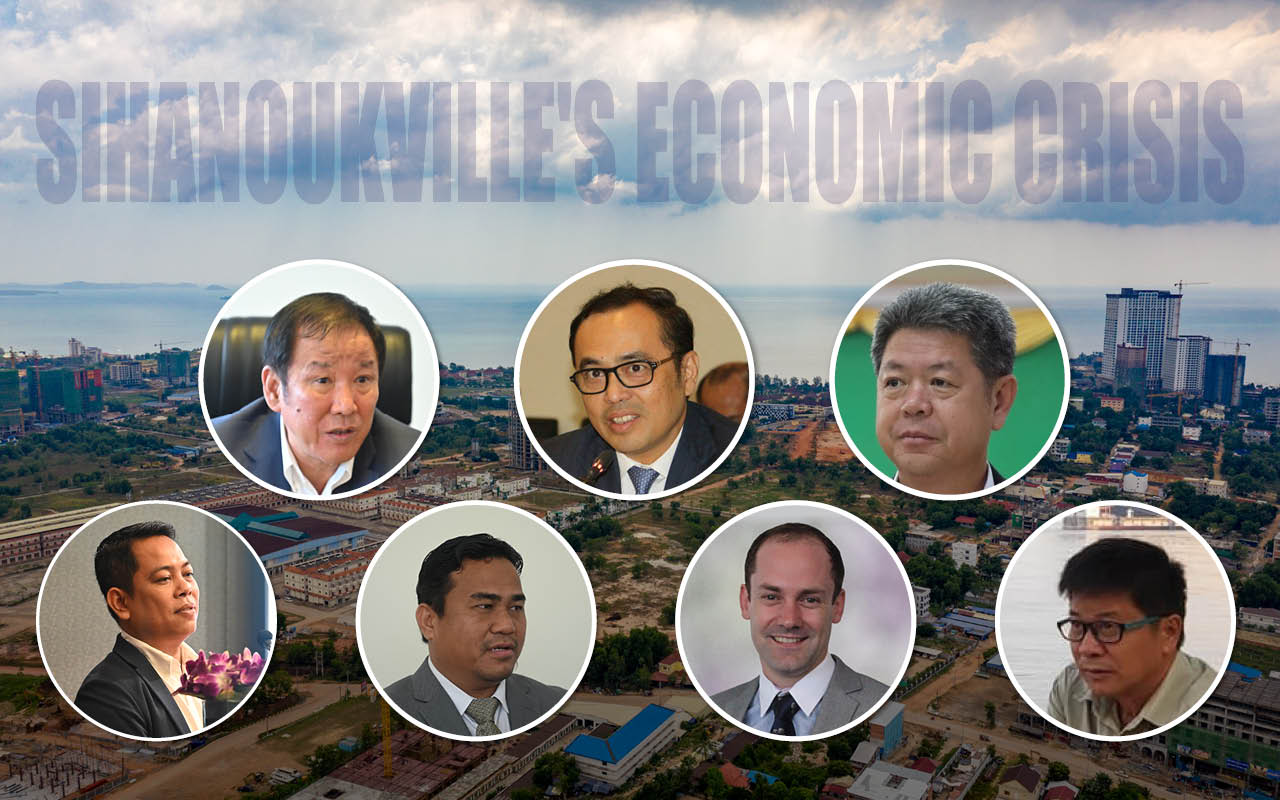Sihanoukville’s economic crisis a painful adjustment toward sustainable development
Sihanoukville, once dubbed the Macao of Cambodia, is currently facing a crisis. Unfinished construction projects are scattered everywhere around the city; numerous local citizens have been left unemployed; and most noticeably, there has been a massive decline in property rental price, leaving many house owners in debt.
These issues have been mainly caused by the crackdown on illegal online gambling in August 2019. This has combined with other factors such as the COVID-19 epidemic, the EBA withdrawal, trade war, and other geopolitical issues around the world to drag down overall economic growth in Cambodia in 2020 to only 6%, with the impact of the crisis in the province becoming more serious.
According to data from Key Real Estate Co., Ltd, prior to the closure of online gambling, the rental price in Sihanoukville was between US$8,000 and US$16,000 per month. Given this high income, many house owners requested loans to build more property in the hope of earning more.
However, everything changed after the government announced the closure of illegal online gambling. Many Chinese gamblers returned home, and the rental price dropped to between only US$ 2,000 and US$ 6,000 per month. As a result, property owners have lost income, are drowning in debt and have suspended their construction projects.
Will the Sihanoukville economy recover, and when?
Local real estate experts project that Sihanoukville’s economy would recover within two or three years, as they have defined this crisis as little more than a painful adjustment as the economy becomes more efficient and sustainable for future development.
According to Mr Sorn Seap, CEO of Key Real Estate Co., Ltd and one of the most well-known real estate experts in Cambodia, although rental prices are falling, the prices of land and houses remain stable. Therefore, it is not hard for the situation to recover.
He believes that two to three years period is a suitable time for all the unfinished projects as well as the other ongoing infrastructure projects to be completed.
The Government of Cambodia is currently building and renovating 34 roads and other infrastructure in Sihanoukville with a budget of US$294 million. This masterplan aims to transform Sihanoukville into a new commercial and tourism hub. Soon enough, this province will also be connected with the capital by a US$2-billion expressway, which is currently under construction. (Read more)
“Thus, when these projects are completed, the economic situation in Sihanoukville will improve and sooner or later investors will come back,” said Mr Sorn Seap.
Similarly, the Cambodian Valuers and Estate Agents Association (CVEA) President Mr Chrek Soknim also believes that Sihanoukville’s economy will be reinvigorated again. He said the decline in the rental price is not an issue, rather a return to normalcy for market prices.
“The rental rate of US$7,000 – US$8,000 is overpriced. Tenants cannot operate their business with this high rental price. Since they have no profit, they have to leave. The market rent should be only US$1,500 to US$2,000. The price is dropping to the market price now, so it won’t take long; I should think in less than a year, investors will return,” said Mr Chrek.
Regarding the issue of unfinished construction projects, in an interview with the Southeast Asia Globe, the president of the Sihanoukville business organisation Oknha Vann Sokkheng suggested that those who rent their land to Chinese-owned projects should consider options like forgoing rent for one year. By doing so, those developers can finish their projects.
However, this is a tough request for those who mainly rely on their rental income to pay off their debt on other projects. As an alternative, Oknha Vann is also requesting the government to relax taxes on construction materials, in addition to lobbying for extensions to loan repayment periods for those who took on debt to invest in Sihanoukville, according to the Southeast Asia Globe.
The same source also reported that the government, through the Governor Kuoch Chamroeun, are willing to cooperate on this issue.
Sihanoukville’s economy is not solely dependent on online games; the Sihanouk Special Economic Zones (SSEZ) and the deep-sea port also play significant roles in helping with the economic recovery, and in a better and more sustainable way. Given the economics incentives provided through SSEZs and the ongoing sea-port upgrade, Sihanoukville will attract more better-quality investors.
Jiang Kexing, formerly associated with the SSEZ and current leader of the local branch of the Chinese Chamber of Commerce in Cambodia, mentioned in the Southeast Asia Globe that the SSEZ employs some 25,000 Cambodian workers, some of which are newly hired from the approximately 8,000 people who lost their jobs in the casinos and hotels.
According to Mr Jiang, he compared the Sihanoukville situation to illness, with it being better to diagnose and deal with sooner rather than later.
The vice-chairman of the Cambodian Constructors Association and CEO of Muhibbah Engineering (Cambodia) Oknha Hann Khieng, also defined the online gaming crackdown policy as an ‘Investor Filtering Policy”, meaning pushing out illegal, and absorbing better quality investors.
“The illegal ones have to leave, and the good ones are able to stay; this is a good thing. Given this new policy, I believe in five years, better quality foreign investors will return,” said Oknha Hann.
Similarly, Mr James Hodge, Director of CBRE Cambodia, also said that the recent ongoing crisis in Sihanoukville could be a good market adjustment for the province. (Read more)
“Activities looks like it is slow; we see land sales slightly lower than what we have seen previously… but it also gives it a strong opportunity to change what has become a slightly difficult reputation, so it’s a turning point for that market,” said Mr Hodges.
Mr Hodge added that with the government reinvesting in infrastructure and the movement on expanding of the airport will all have positive impacts on the market.
Besides the efforts from the private sector, the Government of Cambodia has also recently confirmed its plan to transform Sihanoukville into an industrial city with special economic zones and manufacturing for exports, similar to the Shenzhen industrial city of China. This is also a part of the government’s response to the economic slowdown in this province. (Read more)
H.E. Vongsey Vissoth, Secretary of State, Ministry of Economy and Finance, stated that the government has been and is currently dealing with under-regulated construction projects, and upgrading the infrastructure.
“If we want to change Sihanoukville to be like Shenzhen city in China, it cannot be just a casino. It is an industrial city with services, technology and tourism,” said H.E. Vongsey.
Moreover, from China’s perspective, China is always ready to help Cambodia, in particular Sihanoukville. At a meeting with Prime Minister Samdech Hun Sen on 5 February in Beijing, Chinese President Xi Jinping said China is ready to mobilise Chinese investors and tourists to Cambodia.
However, China needs some time to solve their problem with the COVID-19 epidemic, and when the situation in China gets better, Chinese investors will come back to Cambodia and continue to invest in this country.
- Video Advertisement -



 ខ្មែរ
ខ្មែរ







